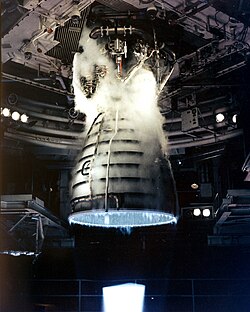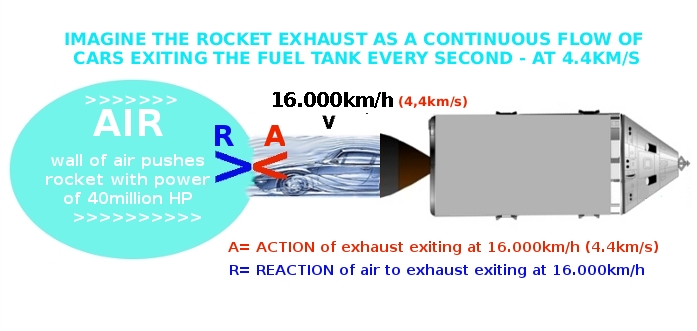40 MILLION HP
The Wondrous Power of Air
I woke up this morning wondering: "how much horsepower would a Porsche Carrera sports car (which is shaped a bit like a rocket plume) need to reach a speed of 16.000km/h (4.4km/s) in our atmosphere?" Remember, that's the velocity at which hydrogen/oxygen propellant is ejected from a rocket nozzle.
To my delight, I found a handy Drag Coefficient/to Horsepower calculator. It basically calculates for you how much horsepower a given car (with a given Cx /aerodynamic drag - and a given weight) would need to reach a given speed. Wonderful! This calculator was just what I was looking for:
http://www.wallaceracing.com/Calculate% ... 0Speed.php
I then looked up the drag coefficient of a Porsche, and found it here : the Cx of a Porsche is 0.3. For the frontal area of the car, I used the figure of 20 Sq/Ft - which I found here. Ok, so it's that of a Chevrolet Corvette - but it should be pretty similar to that of a Porsche. It also approximately matches the stated area of a Space Shuttle main engine nozzle:

http://en.wikipedia.org/wiki/Space_Shuttle_Main_Engine
Then, I looked up the weight of a Porsche Carrera, and found that it is 3230lbs. But I decided to 'cheat' a little, and went with the weight of the larger Porsche Cayenne (4400lbs- or 2000kg) - since it perfectly matches the weight of the fuel mass claimed to be released every second* by large rockets such as Ariane and the Space Shuttle.
*(To be sure, a horsepower unit is defined as a force produced over one second of time. One metric horsepower, for instance, is the power needed to raise a mass of 75 kg against the earth's gravitational force over a distance of one metre in one second).
So, these are the figures I inserted into my wonderful calculator:
Drag coefficient: 0.3 (Cx of Porsche Carrera)
Frontal area of car (think rocket nozzle area): 20Sq/Ft)
Weight of car (think fuel mass ejected per second): 4400Lbs(2000kg)
Velocity of car (rocket exhaust velocity of 4,4km/s): 9941mph (16.000km/h)
Here's what the calculator came up with:

40.239.275 HP - or roughly 40million HP ! Wow! it certainly looks like the REACTIVE FORCE of air, fighting the ACTIVE POWER of a car travelling at hypersonic speeds produces an awful lot of resistance/ counter-power! I honestly didn't think it would amount to as much as 40million HP. But then again, NO Porsche - nor any car - can go as fast as 16.000km/h...
^ NOTE that the rolling resistance (1,516) is absolutely negligible in comparison to the colossal force of AIR. ^

So finally, I decided to look up how much horsepower NASA claims the Space Shuttle engines produce...and... LO AND BEHOLD ! - it isn't far off my above, approximated figure of "40million HP"! Here's from the official NASA website:
"The engines' exhaust is primarily water vapor as the hydrogen and oxygen combine. As they push the Shuttle toward orbit, the engines consume liquid fuel at a rate that would drain an average family swimming pool in under 25 seconds generating over 37 million horsepower."
http://www.nasa.gov/returntoflight/syst ... _SSME.html
Or, if you prefer:
So I guess we can now tranquilly say - without fear of sounding stupid or ignorant - that rockets do indeed push against air - or rather - air pushes against the rockets to propel them up through our atmosphere. Yet, one mystery remains: NASA claims that their rockets reach speeds of 8km/s - almost DOUBLE the 4.4km/s exhaust velocity. Yet, NASA clearly states that their rockets LOSE efficiency as they reach higher altitudes. They even have a name for it: "UNDEREXPANSION":Standing about the same height as the Statue of Liberty but weighing three times as much,
the two white Solid Rocket Boosters ignite in anger and push out a combined 6.6 million pounds of thrust (equivalent to 44 million horsepower.)
http://www.roadandtrack.com/special-rep ... our-ov-105

Source of original rocket nozzle over/under expansion diagram: http://en.wikipedia.org/wiki/Rocket_engine
Oh well, that's NASA for you I guess... In any case, it should be obvious that when air/atmosphere gradually thins out and eventually goes missing altogether(vacuum), no more counter-force (as of Newton's laws)is available for the rocket to keep ascending. Much like a dolphin jumping out of the sea - and briefly flying before gravity brings it plunging back into its own, denser fluid for which it was 'designed for'. Just like a rocket attempting to leap into the void of space.
****
An interesting article about aerodynamic drag: http://phors.locost7.info/phors06.htm
